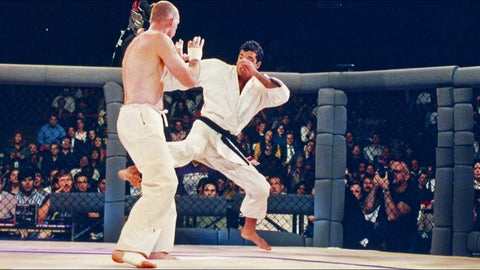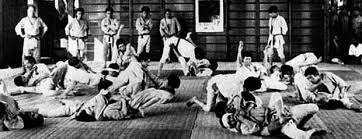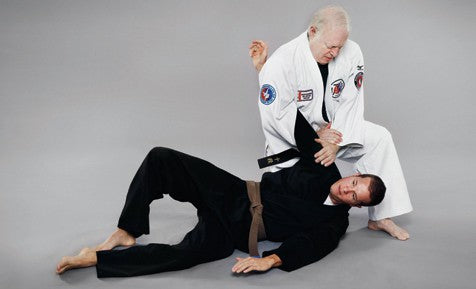
En Estados Unidos, desde los años 90, el arte que practico y enseño se llama Jiu-Jitsu brasileño o, a veces, Gracie Jiu-Jitsu. Quítate el gi y podría llamarse lucha, lucha por sumisión o lucha con nogi.
Algunos argumentarán que los chicos de Judo han estado haciendo más o menos lo mismo que nosotros, los chicos de BJJ, pero durante mucho más tiempo. Si bien estoy en parte de acuerdo, la mayoría de los clubes de Judo se centran mucho más en la práctica de pie y mucho menos en el suelo.

(Foto: Judo de la vieja escuela en Japón)
Cuando los Rorion y otros Gracies trajeron el arte a los EE. UU., ya había pequeños grupos de practicantes japoneses de Jujutsu aquí. En su mayor parte, estos grupos eran bastante pequeños y no ofrecían mucho en términos de combate de resistencia total. Muchas veces, enseñaban kata (formas prescritas), similar a lo que las escuelas modernas de BJJ podrían hacer en sus programas de autodefensa.
(Foto: George Kirby, uno de los primeros profesores de jujutsu japonés en los EE. UU., enlace al DVD )
Debido a que estos grupos de jujutsu japoneses ya estaban en los EE. UU., necesitábamos un nombre para diferenciarlos de sus homólogos brasileños, de ahí el nombre BJJ o Gracie Jiu-Jitsu. Después de ver a Royce en UFC 1 (en vivo por PPV en mi caso), quedó claro que el BJJ era muy diferente al Jujutsu japonés.
Durante mi primer viaje a Brasil me sorprendió saber que en su propio país no lo llaman BJJ, es simplemente Jiu-Jitsu. Mirando hacia atrás, tiene sentido. En Brasil continuaron lo que les enseñaron (por Mitsuyo Maeda y otros profesores japoneses). En aquellos primeros días parece que se prestaba mucha más atención al trabajo de campo, incluso en Japón.
(Foto: Entrevistando a la leyenda Terere en Brasil. Enlace al episodio. )
Eso me lleva a mi pregunta. El BJJ se ha extendido por todas partes en Estados Unidos. Al jujutsu japonés no le ha ido tan bien. Para mucha gente, Laicos y practicantes incondicionales, Jiu-Jitsu = BJJ. Cuando alguien dice “el actual campeón de UFC tiene un gran Jiu-Jitsu, nadie confunde eso con el estilo japonés. En mis conversaciones rara vez uso la B. Creo que es hora de dejarla. ¿Qué opinas? ¡Por favor, deja un comentario a continuación y házmelo saber!




26 comentarios
Ok now drop the B and a few months later add the “A” and create a new sport American Jiu Jitsu? BJJ it is an evolution and since ever no one is trying to hide the Japanese origin of the BJJ
I would suggest Brazilian Judo :-)
With all due respect, but BJJ is NOT Jiu Jitsu. It is Brazilian Jiu Jitsu.
As David says; there is still Jiu Jitsu in it’s traditional form. And you simply can not compare BJJ to traditional Jiu Jitsu.
Because these are two totally different things.
And trust me; I love BJJ.
But it is BJJ, not JJ.
Dropping the B in BJJ is confusing too but I don’t have an answer either. I practice Jujutsu, sometimes called Ju Jitsu or Jiu Jitsu. My art is a Judo, Japanese Jujutsu-based art that focuses more on stand-up control scenarios, incorporating Wally Jay’s Small-Circle Jujitsu, Judo and some Brazilian ground fighting optimizations and compliments Karate and other fighting systems. It is my opinion that BJJ, at least in the sport version, is now a different art than Jujutsu. This is definitely apparent when discussing training, teaching and competition with those who expect BJJ-like behavior (moving to the ground as fast as possible, directly pulling guard, etc.). While I agree that BJJ and Japanese JJ have the same root and are both fun and beneficial in learning, the focus and strengths are different.
The B or G remains necessary because Jujitsu still exists in it’s traditional form. There are a lot of comments on here from black belts in many styles, but we call jiu jitsu “jiu jitsu” internally. To someone who hears bjj mentioned, they may not have any context on the difference in the names and walk into a school that doesn’t offer what they seek. It’s not about maintaining the tradition in that respect, the home of bjj is in California despite it originating in Brazil. I practice GJJ, which has a different goal than the purely sport schools. Regardless if I am traveling and wish to train I shouldn’t have to sift through school that share names that muddies the water of what is offered. Quite simply it’s not worth being considered because bjj helps to differentiate a different style.